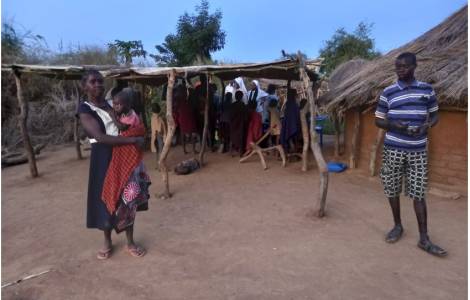
LG
Kanawat (Agenzia Fides) - "Paolino was the cook of our community in the last ten years. He was a good man, and he also had some village-level responsibilities". Sister Laura Gemignani, a Comboni missionary, tells the story which fills her heart and thoughts. With her calm voice, the pain she describes does not convey despair, but a sense of peace. And her story allows us to understand the context in which they live, made up of ferocity and dedication, poor superstitions and gratitude that weave the daily life in which she and her sisters bear witness to Christ's love for everyone.
In the village of Kanawat, a ten hour drive from the capital Kampala, where the nuns have a house, Paolino worked as a cook "he had married Betty, an orphaned girl, who had no one". At the time of the war with the Lord's resistance Army of the rebel Joseph Kony, they had destroyed her family.
She had no education, Paolino had married her and acted as a father, as a mother, he took care of everything and looked for a second job, in order to send his children to school. "He had four goats", continues Sister Laura "and the eldest son, of the eight that the couple had, was unable to go to school. The boy attended the first years and then started taking care of the goats. The only cow that the family owned was then killed to arrange for Paolino's funeral: an obligatory act, because otherwise they feel the vengeance of the dead on them".
Sister Laura says that the man worked for them 15 days a month alternating with another person. "We nuns were already helping the family, paying the school fees for three children. We were able to communicate with him thanks to the minimal amount of English he spoke. He helped us in everything, he even prepared bread for us".
In describing the precarious living conditions of this family, the Comboni Sister explains that Paolino did not even have a piece of land to cultivate and that he had built their house with mud, but on someone else's land. "Now we will have to help them find a piece of land to buy with official documents. Everyone tells his wife that she has to find a job, I also share this thought. Even if taking care of eight children is a full time job. She cannot do anything, if she goes to the market with the few shillings I give her they will take it without giving her anything. A family with eight children thus left with nothing".
Paolino's assassination did not take place during a raid, as often happens in Karamoja. "The perpetrators of this crime were organized thieves. It was late in the evening, Paolino heard the screams of a woman asking for help. He went out to help her, almost in an act of instinctive generosity, without thinking about it, and behind him he had a man with a rifle who killed him with one shot, hitting him straight on the head. He was buried outside his home compound. By culture, no one touches a person who has been killed with a rifle, because it is bad luck. The following morning the news arrived that Paolino was dead and no one had touched him yet. The only person who touched him was Sister Joice who found him in untold conditions after the night in prey to animals. She plucked up her courage and with some bandages, disinfectant, soap and water she cleaned him. Betty, his wife, took the most beautiful suit he had, shoes, socks and dressed him like a prince.
Sister Joice tried to stuff the bullet-ravaged head with cotton in order to make him presentable to her children. My sisters went to the funeral, I went a few days later. Betty did know what to do, the family was given fodd, but the situation is truly dramatic. They need everything".
"We know everything about Paolino's story", continues Sister Laura "because he worked with us. But there are stories and deaths like his every day. This is the situation in which the Church is called to proclaim Christ's salvation, to bear witness to forgiveness, to bring hope and courage to these women. This is why it is so important to have a school in Kanawat. One of my Eritrean sisters takes care of 1,300 children, 300 of whom are in boarding school where they eat and sleep regularly. They grow well if you manage to remove them from the violence of the context in which they were born. So they can concentrate and study, and eat! Many of them come to school because they eat. Now that the school has been closed due to Ebola, the children go to my sister and ask her for some work to do. A reason to stay at school and eat".
If stories like Paolino's were reported on the news of developed countries - imagines Sister Laura - perhaps many would change the channel, "because they do not want to hear about it and want to be in peace. But until there is peace in the house of others there will be no peace in our house. My dad used to say: if you want to see grass in your house, try to water your neighbor's". (LG/AP) (Agenzia Fides, 10/12/2022)